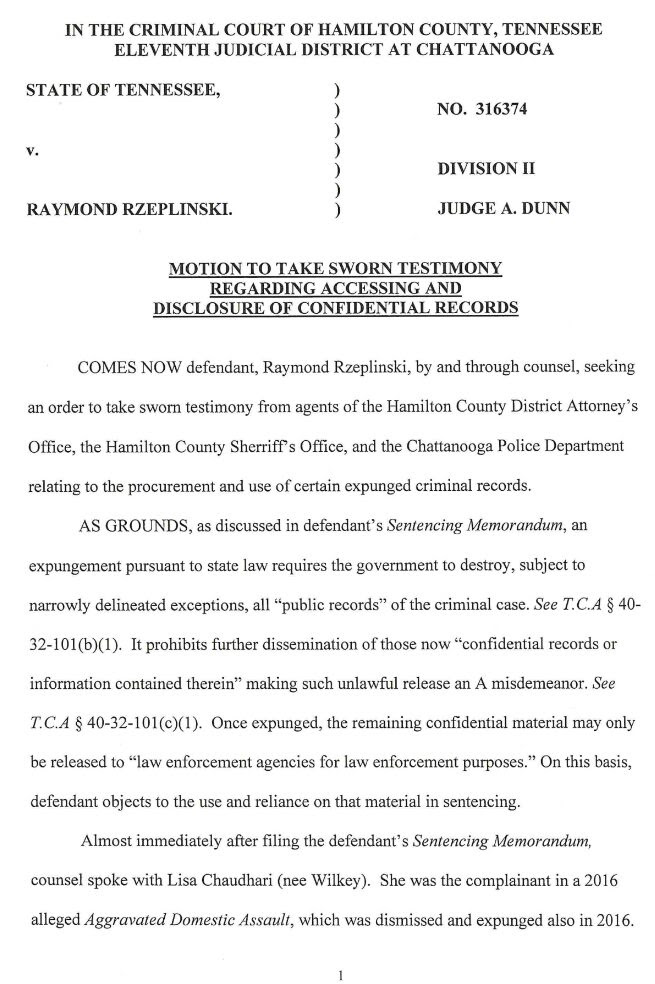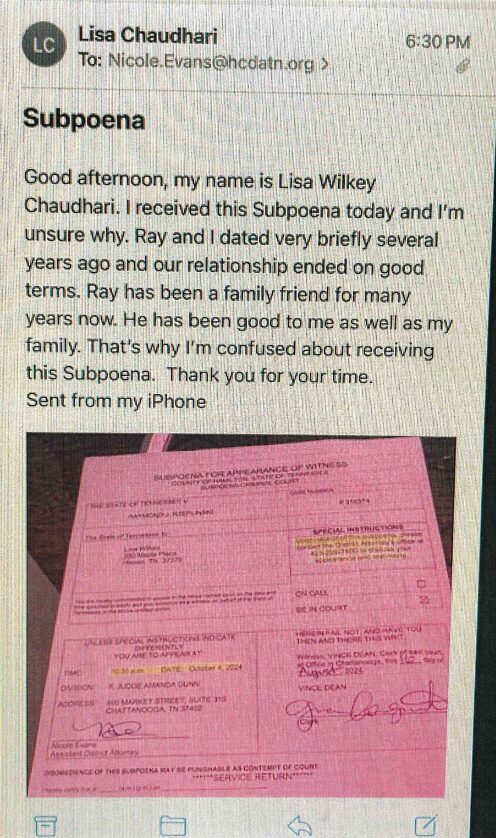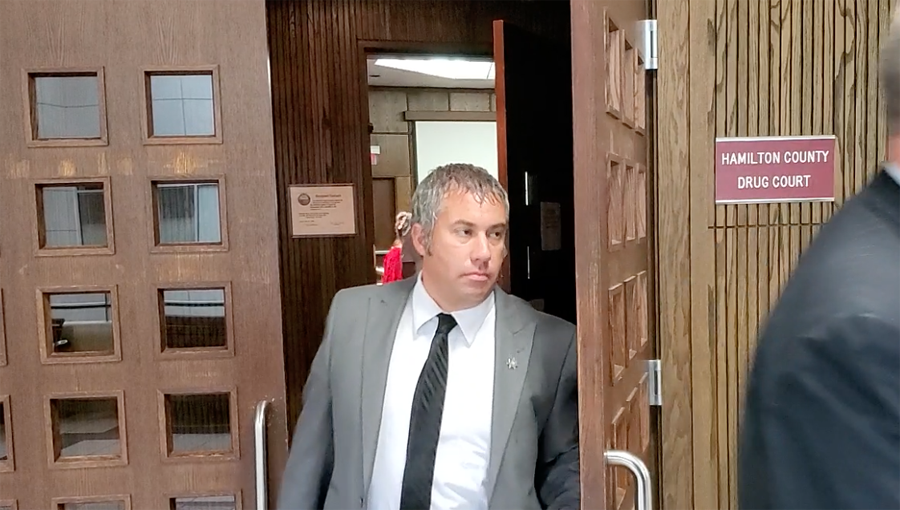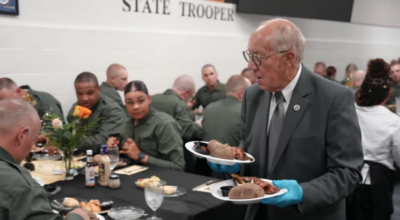
Nicole Evans is the prosecutrix in the Ray Rzeplinski case who is a picture of lawless use of the law, prosecuting a man whose criminal record was said by state of Tennessee at least 55 times to be that of misdmeanant. She gazoozled a jury to convict him on 55 felon-in-possession gun counts. (Photo David Tulis)

Page 1 of a motion demanding the propriety of Coty Wamp’s DA office’s skulking about in expunged records to find favorable evidence and witnesses.
CHATTANOOGA, Tenn., Saturday, Oct. 5, 2024 — In the sentencing Monday of Ray Rzeplinski on 55 felony convictions, there is agreement between state and Mr. Rzeplinski that prison is unjust, and that justice is better served by probation.
Judge Amanda Dunn gives sentence of 8 years probation, the minimum, with each of the 54 8-year terms running concurrently, with a one-year term attached for the last offense on the short-barreled rifle.

Coty Wamp, district attorney
Hamilton County sheriff’s office, now run by Austin Garrett, brought the vindictive prosecution. DA Coty Wamp, who worked as former sheriff Jim Hammond’s counsel, inherited the case when she took office as DA following an election.
The sentencing doesn’t smooth down the many thorns, thistles and briars sticking out all over from the four-year prosecution of a plumber whose crime plea as a 19-year-old was in criminal court and, he believed, expunged following action by an attorney.
Necromancing evidence
Miss Wamp in this case appears transfixed by the possibility of unexpunging dead cases. She does it Monday in subpoenaing a witness who appears in criminal court. 2A Ray’s attorney Ben McGowan objects to the Wamp office going into expunged records to find Lisa Chaudhari, involved in an alleged 2016 aggravated domestic assault case.
Mr. McGowan demands the court investigate as a possible crime by the DA’s office the use of “confidential records,” or expunged records not available to anyone in the public. Wamp ADA Nicole Evans likens the McGowan allegation to a personal insult.
Did Miss Wamp and the HCSO do the same with Mr. Rzeplinski — go into confidential records in its vindictive prosecution of owner of Ray’s Plumbing, with his 1995 burglary case from Bradley County?
Ben McGowan MOTION on confidential records — objecting
When did Mr. Rzeplinski’s alleged felony get put into the NCIC database? Was it 1995, when the purported felony “crime of violence” occured? Or was it 2019, when a personal grievance of parties within the Hamilton County sheriff’s department began a vendetta against Mr. Rzeplinski, allegedly originating with his ex-wife, his felony only then entered?
‘We don’t have the smoking gun of an expunction order, but we have the bullet casings of all the peripheral stuff around it,” says Christopher Sapp, midstate bureau chief of Copperhead Radio Network. “Mr. Rzepllinski has an expungement order request, and a followup inquiry indicating there is no record of an offense from Bradley County. It’s been cleared. No results were found post expungement order. So where’s the judgment?”

This text message is an exhibit in Ben McGowan’s motion to put ADA Nicole Evans on the witness stand to find out how she peeked behind an expungement to get at desirable facts. What is an expungement worth if a prosecutor as part of “law enforcement” can dig up the past that is officially forgiven and forgotten?
It seems the expungement, with under government people such as Coty Wamp, is a mere simulacrum. It’s a record deleted vis a vis the world, but not to one in “law enforcement” whose employees can dig out the underlying facts of a crime or charge.
“An expungement order restores rights,” Mr. Sapp says. “If it was signed, and is in the record, could somebody find the order and safely delete it?
“At least.55 separate occasions aside from an expunction order, the state has restored Ray’s citizenship and his right to keep arms – in 55 separate occasions. You’d think that if there was something against Ray Rzeplinski somewhere in some database anywhere, that the state had knowledge of it.”
“Do you think Ray police get paid off? A clerk way back then said they don’t put this in the computer? Ray has maintained his innocence and said I have no knowledge of this. I’ve never had a felony. Misdemeanor, yes. I paid my dues.”
“They’ve ruined this man’s business. They’ve ruined this man’s life. They’ve effectively put him out of business.”
“Is this a violation of due process for them to go back behind the expungement, and if so, who’s to blame for it?”
“This thing stinks like a dead body because, it’s grave robbery. Someone’s gone in, they’ve dug in the graveyard of expunction where they’re not allowed to do that. They’ve disturbed the dead. That’s why this whole case smells of rotting flesh. They’ve dug up the bones of an expunged felony. Somebody went in there and pulled that expungement out of the record, and made it disappear.” He suspects somebody pulled the judgment of expungement out of the record.
“How are you going to make Ray Rzeplinsky the guilty party after 2 decades of state screwups? ”
“So, now two decades later, you’re gonna make Ray Rzeplinski, after you told him 55 times he can keep and bear arms, you failed to tell him in his initial appearance, when he confessed to this, the judge doesn’t tell him he’s got a felony, he’s pleading to misdemeanors, the word felony does not come out of anybody’s mouth in this thing” in Bradley County criminal court, “and it doesn’t appear on the record some, except on this form that this officer, two decades, somehow, two decades later, finds. I don’t buy it.”
Government approvals to show Mr. Rzeplinski’s state of mind were numerous. He had state OK for more than 100 gun purchases retail. In 1998 he was hired by a wrecker service, undergoing a background check and working there about two years. In 1997, involved in a firearm discharge accident with a Rzeplinski pistol he learned had been stolen, sheriff’s deputies looked over his gun collection and ran checks on all the serial numbers — and him, with no evil result about his background.
The following is our take on reasons why the Rzeplinski verdict deserves to be overturned on appeal.

Jason Maucere is the Hamilton County sheriff’s office detective who help “nail” Ray Rzeplinski in an over-the-top case of malicious prosecution brought to a boil by district attorney Coty Wamp, a Republican. (Photo David Tulis)
Why superseding indictment?
Did the Prosecutor err in presenting charges to the grand jury beyond the statute of limitations for the offenses involved? The indictment presented is referred to as a “superseding indictment. Where is the original and when was it first presented?
By Christopher Sapp / Midstate bureau chief
Argument: The Statute of Limitations for felons in possession of a handgun is 2 years. Since the alleged incidents happened in 2019 and it does not appear that an initial indictment was sought at that time, it seems these charges were inappropriately advanced to the Grand Jury and that all relative counts of the Indictment should be quashed. Where is the original indictment?
Denial right to address jury
Did the trial court abuse its discretion and commit reversible err by unconstitutionally prohibiting or abridging Mr. Rzeplinski’s federal and state constitutional right(s) to personally introduce evidence and/or personally address the jury in argument of his own affirmative defense(s), as secured to him under TN Const. art I § 9; and as otherwise prohibited by TN Const. art XI § 16 and Tenn. Code Ann. § 16-3-403?
Argument: No, because Judge Amanda Dunn partly ceded to these demands, recognizing that refusing to do so is reversible error.
TN Const art 1 § 9 states, “That in all criminal prosecutions, the accused hath the right to be heard by himself and his counsel; to demand the nature and cause of the accusation against him, and to have a copy thereof, to meet the witnesses face to face, to have compulsory process for obtaining witnesses in his favor, and in prosecutions by indictment or presentment, a speedy public trial, by an impartial jury of the county in which the crime shall have been committed, and shall not be compelled to give evidence against himself.”
TN Const. art. XI § 16 states, “The declaration of rights hereto prefixed is declared to be a part of the Constitution of the state, and shall never be violated on any pretense whatever. And to guard against transgression of the high powers we have delegated, we declare that everything in the bill of rights contained, is excepted out of the general powers of the government, and shall forever remain inviolate.”
Moreover, Tenn. Code Ann. § 16-3-403 enjoins the courts as follows, “The rules prescribed by the supreme court pursuant to § 16-3-402 shall not abridge, enlarge or modify any substantive right, and shall be consistent with the constitutions of the United States and Tennessee.
Judge Dunn prohibited Mr. Rzeplinski from addressing the jury himself and barred from introducing evidence on which he relied in good-faith, the trial court exceeded its authority and prejudiced Mr. Rzeplinski during his trial, in contravention of the constitutional limitations imposed on the court.
The net effect of the court’s actions unconstitutionally prohibited Mr. Rzeplinski from introducing exculpatory evidence and arguing the affirmative defenses of reliance and estoppel by entrapment. Mr. Rzeplinski was threatened with removal if he “disrupted the proceedings” with any vocalized protest or remonstrance, a violation of TN Const. art. I § 23.
“That the citizens have a right, in a peaceable manner, to assemble together for their common good, to instruct their representatives, and to apply to those invested with the powers of government for redress of grievances, or other proper purposes, by address or remonstrance.” TN Const. art. I § 23
Illegal delay
Was the 4½ year delay from initial arrest through the commencement of trial a violation of Mr. Rzeplinski’s federal right to a speedy trial under the 5th Amendment?
Was this a dilatory strategy by the prosecutor’s office to prevent Mr. Rzeplinski from filing civil charges against the HCSO for their excessive use of force in arresting his person, until after the civil statute of limitations had passed?
Vindictive prosecution for refusal to plea
Malicious or vindictive prosecution? – Mr. Rzeplinski timely objected to the superseding indictment with 58 counts after he refused to enter a plea bargain. Judge Dunn ruled that the prosecution was not vindictive or malicious.
TIMELINE Plea and Sentencing
➤ At 2:35 into the Rzeplinski1 Digital Version of Plea, the 1995 trial court collectively addresses and arraigns “all you people, including Ms. Gray here” (“defendants”) en masse and did also innocuously refer to the cumulative charges as “some criminal offenses”; however, the court erred by failing to adequately and properly inform the defendants of the nature of each charge in failing to disclose and distinguish between the felony count and the misdemeanor count – a violation the defendant’s Tenn Const. art. 1 § 9 right to be informed of the nature and cause of each accusation against them.
➤ At 3:04 into the Rzeplinski1 Digital Version of Plea, the 1995 trial court asserts, “…and if you plead Not Guilty, this gives you a right to a trial by Jury – and in a trial by Jury you have certain rights, you have the right to be represented by an attorney – one of your own choice or one furnished by the state, if you cannot hire an attorney. Do ya’ll understand that?” This is the court’s first indication of any right to representation by an attorney. The net effect of this particular wording led the accused to the mistaken understanding and false belief that counsel would not be provided to each individual accused prior to a “trial by Jury,” the same being a violation of the defendants 5th, 6th, and 14th Amendment right to counsel and due process at every critical stage of the prosecution.
➤ By failing to adequately inform and orally make clear to the Defendants that they were each entitled to counsel at the point of arraignment, the Court did err, leading Mr. Rzeplinski to a false understanding and mistaken belief regarding his right to the appointment of individual counsel to assist him with plea bargain negotiations. This critical disclosure was only discussed and made known after-the-fact, when the court realized it needed to put the horses back in front of the cart. Due to their ignorance of due process, the boys did not discern the judges error and sheepishly agreed with whatever the judge suggested, not wishing to worsen their fate…they were in a vulnerable state and at a distinct disadvantage.
➤ At 4:06 into the Rzeplinski1 Digital Version of Plea, the 1995 trial court advises and inquires, “Now do ya’ll understand that by pleading guilty you’re giving up all those rights I just told you that you have? Do ya’ll understand that you plead guilty and I accept your plea you got these convictions on your record, and what that means is somewhere down the line, if you got in trouble again, the chances are REAL GOOD that you will get a greater punishment for any offense committed in the future than you’d get if you didn’t have these convictions? Ya’ll understand that?”
➤ Mr. Rzeplinski, being young, naive, and unlearned in the law, was prejudiced by the courts non-existent, incomplete, or inadequate disclosures regarding not only his right to individual counsel prior trial, but also by the court’s lack of candor and disclosure regarding the felony/misdemeanor nature of the charges and the resulting consequences of a felony conviction, the same having worked to Mr. Rzeplinski’s clear disadvantage, due to Mr. Rzeplinski’s relative lack of sophistication, legal prowess, and understanding of the law.
➤ Ray Rzeplinski was naively led down a path of destruction due to a conspicuous withholding of information and after-the-fact “breadcrumbing” from the bench. Had the 1995 trial court’s colloquy with Mr. Rzeplinski been more thoroughly informative and more precisely worded regarding the felony charge, Mr. Rzeplinski would have exercised a greater degree of care and sobriety with regard to the election of his plea.
➤ It is not known how much notice was provided to Mr. Hughes prior to his appointment as counsel and whether he actually consulted with his appointed “clients” prior to their standing for arraignment on the charges. Did Mr. Hughes meet with Mr. Rzeplinski individually to fully discuss the true nature of the charges? Did Mr. Hughes actually discuss the plea agreement in depth with Mr. Rzeplinski? Did Mr. Hughes adequately disclose and discuss the immediate consequences and restrictions of a guilty plea? Did Mr. Hughes disclose, elaborate, and discuss the long-term ramifications of any such plea to the felony burglary charge with Mr. Rzeplinski, or were such details simply glossed over in the interest of “judicial economy”?
➤ In the Rzeplinski2 Digital Version of Plea at :20, the Court informs public defender, Mr. Hughs, that “The judgements in these cases will reflect that..ugh..the defendants consideration for community corrections program will be held in abeyance pending the outcome of the charges instanter in Hamilton county” At no time did the Court’s colloquy adequately inform and apprise the Defendants that the burglary allegation was a felony.
➤ At 1:59 into the Rzeplinski2 Digital Version of Plea the prosecutor informs the court, “Subject to the Court’s approval, all defendants would be entering identical pleas and would get identical sentences, but they would be suspended for different amounts of time.” Ray Rzeplinski had no prior criminal record and did not personally enter the store or steal cigarettes.
➤ At 3:10 into the Rzeplinski2 Digital Version of Plea the Prosecutor’s proposal was that “All defendants would plead guilty to the indictment and be sentenced as follows: on the burglary – 3 years, on the misdemeanor theft 11 months 29 days suspended. Each defendant would be jointly and severally liable for $500 in restitution, to the victim. Each defendant will perform 30 days of community service, at the rate of at least two (2) days a month or as otherwise directed by [indecipherable], and pay court costs as directed …. Mr. Rzeplinski, 30 days in jail before suspension. That’s our entire agreement, your Honor.”
➤ At 5:24 into the Rzeplinski2 Digital Version of Plea, the court inquired, “Alright, Mr. Rzeplinski, have you signed these documents of your own free will and accord? Are you pleading guilty because you are guilty?” Rzeplinski responds in the affirmative to both questions with the mistaken belief and understanding that he was pleading to misdemeanor charges and agreeing to suspended sentencing on a misdemeanor charge. At no time was the burglary charge referred to or characterized as a “felony” or a “crime of violence” by the trial court.
➤ All of the defendants were unanimously represented en masse by Mr. Hughes of the public defender’s office and the defendants likely did not fully appreciate, discern, or understand the conflict of interest of the state’s failure to provide individual counsel once jeopardy attached, prior to their entry of a plea.
The 1995 trial court did err and violated Mr. Rzeplinski’s 6th Amendment right to individual counsel by failing to inquire, offer or provide independent counsel for each alleged accused at the point of arraignment and prior to plea negotiations.
1995 young defendants denied proper notice
➤ There is no evidence that the defendants were adequately informed of, properly understood, or fully appreciated, the felonious nature of the burglary charge nor its long-term consequences prior to their entry of a guilty plea. There is no evidence that the defendants received a physical copy of the indictment, nor that they were properly counseled by Mr. Hughes of the public defender’s office about the felonious nature of the burglary charge.
Being scared and unfamiliar with the courts, the misguided and delinquent teenagers entered pleas without adequate disclosure as to the characterization of the burglary charge.
➤ The prosecutor properly described the theft charges as a “misdemeanor” which would account for Rzeplinski’s recollection of events, but no mention of a “felony” was ever made at the time of arraignment, prior to entry of a plea, nor even at the point of sentencing.
The boys were shuffled into a plea agreement absent adequate counsel or full knowledge and understanding of the consequences. This is why Ray Rzeplinski has honestly thought for decades that he entered into a plea agreement for misdemeanor charges…the word “felony” was never mentioned – not by the prosecutor, not by the judge, nor even by the public defender.

